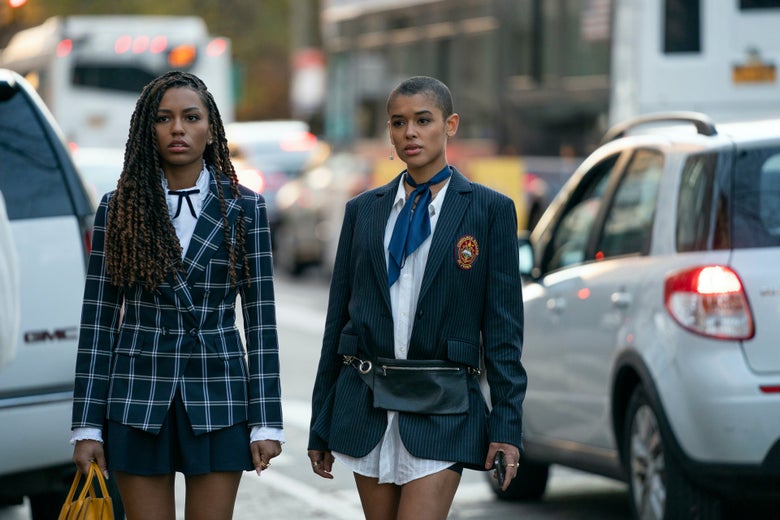
Gossip Girl, like Mad Men and the Strokes, had a cultural footprint its actual audience could swim around in. Never watched by much more than 4 million people, a number that drifted below a million over its six-season run, it was nonetheless a zeitgeist-capturer, a fame-catapulter, and a media darling, the kind of show people know about whether they’ve seen it or not. Based on a series of turn-of-the-millennium YA novels, the show premiered on the CW in 2007, right before the financial crash, and barnstormed through the nation’s falling fortunes with the indifference of the truly rich. It followed a set of extraordinarily privileged and terrifyingly sophisticated high school students in a borderline satirical manner, teasing the aspirational opulence it showcased just enough to be able to plausibly deny flat-out celebrating it—which is mostly what it was doing. The title character’s famous signoff, “You know you love me,” is also a neat summation of the series’s feelings about the preposterously wealthy.
The original Gossip Girl is not alone in its fascination with Scrooge McDuck piles of lucre, which is presumably why this particular intellectual property has been revived by HBO Max, nine years after the original went off the air. The reboot features a whole new cast of beautiful and entitled students who lounge on the Met steps while attending an elite Upper East Side private school. Showrunner Joshua Safran recently told Variety that “these kids wrestle with their privilege in a way that I think the original didn’t. In light of [Black Lives Matter], in light of a lot of things, even going back to Occupy Wall Street, things have shifted”—a remark that was widely tweeted and duly dunked-upon. (Keep our horribly rich people horrible and rich!) But it overstates things. To get a sense of the show, I would direct you instead to this New York magazine feature in which Safran obsesses about his lead character attending the correct New York City hot spot. This is the new Gossip Girl: one in which you might overhear the word privilege, but coming from a group of teens Instagramming themselves while holding court at Frenchette.
In the new Gossip Girl as in the old, there’s plenty of holding court—at hip restaurants, nightclubs, school functions, the opening of a new (fictional) Jeremy O. Harris play at the Public. (He cameos, naturally.) So much of the new series seems designed expressly for Jessica Pressler and Chris Rovzar’s lovingly eagle-eyed “reality index” recaps that I got embarrassed by the dialogue’s elaborate place name–dropping—it’s like watching someone wait for a date that might never show up. The new characters are not as white or straight and they rarely live on the Upper East Side, but they are otherwise a mix and match of the original’s personalities.
[Read: June Thomas on the Gossip Girl Finale]
The central pair are now two Black half sisters, Julien (Jordan Alexander) and Zoya (Whitney Peak). Julien’s a popular, gorgeous model and influencer who has a shaved head, a robust social media presence, a rock star father, and, like Serena (Blake Lively) before her, It Girl status. She’s juxtaposed with the younger Zoya, who’s also gorgeous, but morally pure and social media–unsavvy, a middle-class artiste who is a kind of gender-swapped Dan Humphrey (Penn Badgley), the outsider who gets sucked in. Zoya’s love interest, Obie (Eli Brown), also inevitably Julien’s ex, is a class-swapped Dan, an earnest cutie with good politics, who even lives in Brooklyn—except he’s the extremely rich scion of real estate developers with a Dumbo manse. The most one-to-one translation is Max (Thomas Doherty), a more gender-fluid and consent-seeking variation on Chuck, an omnisexual trickster who does lots of drugs and everybody else. There’s also Julien’s indistinctive best friend, her sexually confused boyfriend, a bunch of parents played by good actors (Laura Benanti, Luke Kirby, etc.), and a pair of mean girls—Luna (Zion Moreno) and Monet (Savannah Smith)—who almost run away with the show.
They do so because they are the only extant evidence of what the original series understood in its bones: that it’s good to be bad, as in good to watch. Monet’s a lesbian and Luna hates the patriarchy, but they are still scheming strivers and thank goodness for that. This, to me, is where contemporary social storytelling mores have most undermined the reboot: It’s so concerned about empathy it’s a little dull. Anyone who really watched Gossip Girl knows that it was Blair Waldorf (Leighton Meester) who made the series, the all-seeing queen bee who wanted to control everything but was constantly having her thunder stolen by the effortless Serena (a dynamic that even played out extratextually as Lively got the movie star’s career, even though Meester walked away with the show). Julien makes mistakes, she can be cruel sometimes, but she’s a Serena; she’s not scheming in her bones, she’s just suggestible. Gossip Girl’s plum role, lead bitch, has been left vacant. Every table at Frenchette can’t help a show missing a true protagonist.
[Read: The Class-Conscious Reboots Hollywood Should Make After Gossip Girl]
In the absence of a teen who wants something not worth having with all of her might, we get, instead, a teacher. The biggest change to the original formula comes with the introduction of the instructors as characters unto themselves, led by Kate Keller (Tavi Gevinson). (Not going to pretend—the casting of Gevinson as an “old” sure trolled me!) Toyed with, condescended to, and sneered at by their entitled students, a handful of teachers band together to get their power back, reviving a defunct nom de gossip. It’s a conceit with a wink: Gossip Girl has always been a show about teens that’s obsessed over by adults. Now that’s happening inside the show itself, so-called adults banding together to rip up the socially mediated faux-selves these teens present to the world—however low they have to sink to do it.
As in the first series, the real snake in the grass—the character driven to immoral distraction, selling out friends and acquaintances for the high of putting rich children in their place with a bon mot notable rich person Edith Wharton would admire—is a member of the lame-o middle class. For all that the new iteration has a heightened awareness of privilege, the show’s class politics remain borderline aristocratic. On Gossip Girl, those to the manner born just have that je ne sais quoi, a comfort in certain spaces and settings, a certainty they deserve watching and noticing that the series shares. Having money gives these high schoolers a rarefied, strange, challenging life, and on the show it’s the people who don’t have it, who want it, who have their face pressed up to the glass, who get warped. But the show can’t extend this insight as far as it should go. In American life, no matter how much money a person has, there’s no one who doesn’t want more of it. We’re warped all the way to the top.
Gossip Girl: HBO reboot adds self-awareness but not much insight. - Slate
Read More

No comments:
Post a Comment